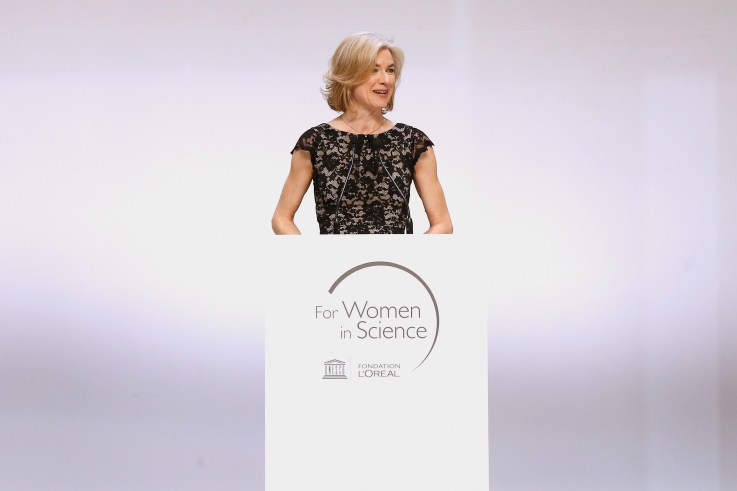前進するCRISPR-Cas9発明者の「ヒト遺伝子組換え」計画
CRISPR-Cas9 inventor Jennifer Doudna’s plans on moving forward, genetically modifying humans
The decision of who owned the rights to a hotly disputed CRISPR gene editing patent came down in favor of the Broad Institute of MIT and Harvard today so you’d think the mood would be sour at the University of California, Berkeley, the other contender in the case. But Berkeley’s Jennifer Doudna tells TechCrunch this is a positive for her.
熱く争われた遺伝子編集特許CRISPRの権利所有者の決定が、本日、MITとハーバード大のブロード研究所にとって有利な状況になりました。 こうなると、カリフォルニア大やバークレーなど他の競争者には分が悪くなると考えるかもしれません。 しかし、バークレーのジェニファー・ドゥドナがTechCrunchに、これは彼女にとってポジティブだと語りました。
- disputed - 争った
- the mood would be sour - 雰囲気が悪くなる
- contender - 競争者
“I’m actually delighted to know the claims of our original patent have been allowed by the patent examiner and can now move forward towards issuance,” she said.
「私は、私たちの当初の特許の主張が特許審査官により認められ、今や発行に向けて前進できることを知り、実際に喜んだのです。」
- the patent examiner - 特許審査官
Doudna is credited with being the first to figure out how to use CRISPR to program cells using the Cas9 enzyme. UC Berkeley filed a patent on behalf of Doudna’s work but the Broad Institute used a fast-track option to beat UC Berkeley to the punch when it came to a patent for the same technique on the more complex eukaryotic cells — a nuanced difference that Doudna and her co-inventor Emmanuelle Charpentier claimed was an “obvious” next step in the process and should not be considered for a separate patent. While much of the science world seemed to agree with Doudna and her cohorts, the U.S. patent office thought the Broad Institute deserved a separate patent for making that leap.
ドゥドナは、Cas9酵素を使用して細胞をプログラムするCRIPRの使用法を最初に理解した人として知られています。 UCバークレーがドゥドナの取り組みを代表して特許を申請しましたが、ブロード研究所は、さらに複雑な真核生物での同様の技術の特許となったときには、UCバークレーにパンチを食らわせるため、迅速な選択肢を使用しました。
ドゥドナと彼女の共同発明者であるエマニュエル・シャルパンティエが主張した微妙なニュアンスの違いは、プロセスの中の「明らかな」次の段階であり、特許の分割を懸念するべきではないというものでした。 科学界の多くはドゥドナと彼女の仲間に同意すると見られていることから、米国の特許庁は、それを前進させるために、ブロード研究所が特許の分割に値すると考えたのです。
- credited - 知られている、信じられている
- enzyme - 酵素
- on behalf of - 代表して
- a fast-track - 迅速な
- eukaryotic - 真核生物
- cohorts - 子分、一味
But, as Doudna points out that, though the judge did not throw out the Broad Institute’s claims to that patent, it also doesn’t throw out her claim that her patent should be able to cover all cells. “We’re actually anticipating getting our patent issued finally, one that has very broad claims,” she says, comparing the two patents to tennis balls.
しかし、ドゥドナがそれを指摘しているように、判定がブロード研究所の特許に対する主張を退けなかったからといって、彼女の特許がすべての細胞をカバーできるべきであるという彼女の主張をも退けないとは限りません。 「私たちは実際に私たちの特許が最終的に発行されることを予期しているのです。非常に幅広い主張です。」 彼女は2つの特許をテニスボールに例えて言っています。
“The analogy I’ve used to explain this is the Broad Institute’s patent is for green tennis balls but the patent we will have is for all tennis balls,” Doudna told TechCrunch.
「私が説明してきたアナロジーは、ブロード研究所のは緑色のテニスボールについての特許だが、我々の特許は全てのテニスボールについてのものだということです。」このように、ドゥドナはTechCrunchに語りました。
売り上げランキング: 6,041
What the decision doesn’t make clear is who companies should now license from. Companies such as Monsanto, GE Healthcare and others working with the Broad Institue or Doudna’s CRISPR startup Caribou Bioscience may have to get licenses from both parties if they want to work on CRISPRing plants and animal cells for research.
決定が明確でないことは、今の時点で、どの企業からライセンスするべきなのかということです。 モンサントやGEヘルスケア、そしてブロード研究所や、ドゥドナのCRISPRスタートアップであるCaribou バイオサイエンスと一緒に取り組む他の企業は、 彼らがCRISPRを使用した工場や、研究用の動物の細胞で仕事をする場合に、 両方のチームからライセンスを取得しなくてはならないかもしれません。
“This will be an on-going thing and most likely additional filings,” says Doudna, who also did not rule out the potential Berkeley could appeal the decision.
「これは進行中の事になり、追加申請になる可能性が高い」 ドゥドナは、バークレーが決定を求められる可能性を排除せず、このように言っています。
Meanwhile, Berkeley has formed a partnership with the University of California San Francisco to form the Innovative Genomics Institute (IGI), which will be working with Doudna’s technology to research solving human genetic diseases and is also looking at solving issues in plant genomics.
こういうことから、バークレーはカリフォルニア州のサンフランシスコの大学と提携を結んだのです。 人の遺伝病の解決の研究にドゥドナの技術によって取り組むであろう、革新的ゲノミクス研究所(IGI)を形成するためにです。 そして、その技術は、植物遺伝子の問題を解くとも見られています。
But the important piece for Doudna is that everyone can at least start to move forward in applying the technology. “In the end, as scientists, we would all like to see this technology help people and ultimately that’s got to be the goal that we all have,” she tells TechCrunch.
しかし、ドゥドナにとって重要なのは、技術を適用することにおいて、すべての人が少なくとも前に勧め始められるという点です。 「最後には、科学者として、私たちはこの技術が人々を助けるところを見たいのです。そして究極的に、我々全てが持つゴールになることになるのです。」このように彼女は語りました。
The decision may come at just the right time as the use of CRISPR in modifying human embryos with certain heritable diseases was just approved by a science advisory panel formed by the National Academy of Sciences and the National Academy of Medicine this week.
この決定は、丁度良い時に下されたのかもしれません。 今週、特定遺伝病での人の胚の改変にCRISPRを使用することが、 国立科学アカデミーと国立医学アカデミーで形成される科学アドバイザリーパネルによって、 承認されました。
- embryos - 胚
元記事は以下。



